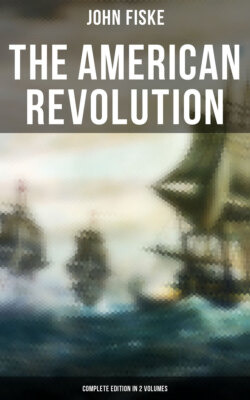Читать книгу THE AMERICAN REVOLUTION (Complete Edition In 2 Volumes) - Fiske John - Страница 56
На сайте Литреса книга снята с продажи.
The “Boston Massacre”
ОглавлениеTable of Contents
Presently Captain Goldfinch, coming along, ordered the men into their barracks for the night, and thus stopped the affray. But meanwhile some one had got into the Old Brick Meeting-House, opposite the head of King Street, and rung the bell; and this, being interpreted as an alarm of fire, brought out many people into the moonlit streets. It was now a little past nine. The sentinel who was pacing in front of the Custom House had a few minutes before knocked down a barber’s boy for calling names at the captain, as he went up to stop the affray on Brattle Street. The crowd in King Street now began to pelt the sentinel, and some shouted, “Kill him!” when Captain Preston and seven privates from the twenty-ninth regiment crossed the street to his aid: and thus the file of nine soldiers confronted an angry crowd of fifty or sixty unarmed men, who pressed up to the very muzzles of their guns, threw snow at their faces, and dared them to fire. All at once, but quite unexpectedly and probably without orders from Preston, seven of the levelled pieces were discharged, instantly killing four men and wounding seven others, of whom two afterwards died. Immediately the alarm was spread through the town, and it might have gone hard with the soldiery, had not Hutchinson presently arrived on the scene, and quieted the people by ordering the arrest of Preston and his men. Next morning the council advised the removal of one of the regiments, but in the afternoon an immense town meeting, called at Faneuil Hall, adjourned to the Old South Meeting-House; and as they passed by the Town House (or what we now call the Old State House), the lieutenant-governor, looking out upon their march, judged “their spirit to be as high as was the spirit of their ancestors when they imprisoned Andros, while they were four times as numerous.” All the way from the church to the Town House the street was crowded with the people, while a committee, headed by Samuel Adams, waited upon the governor, and received his assurance that one regiment should be removed. As the committee came out from the Town House, to carry the governor’s reply to the meeting in the church, the people pressed back on either side to let them pass; and Adams, leading the way with uncovered head through the lane thus formed, and bowing first to one side and then to the other, passed along the watchword, “Both regiments, or none!” When, in the church, the question was put to vote, three thousand voices shouted, “Both regiments, or none!” and armed with this ultimatum the committee returned to the Town House, where the governor was seated with Colonel Dalrymple and the members of the council. Then Adams, in quiet but earnest tones, stretching forth his arm and pointing his finger at Hutchinson, said that if as acting governor of the province he had the power to remove one regiment he had equally the power to remove both, that the voice of three thousand freemen demanded that all soldiery be forthwith removed from the town, and that if he failed to heed their just demand, he did so at his peril. “I observed his knees to tremble,” said the old hero afterward, “I saw his face grow pale,—and I enjoyed the sight!” That Hutchinson was agitated we may well believe; not from fear, but from a sudden sickening sense of the odium of his position as king’s representative at such a moment. He was a man of invincible courage, and surely would never have yielded to Adams, had he not known that the law was on the side of the people and that the soldiers were illegal trespassers in Boston. Before sundown the order had gone forth for the removal of both regiments to Castle William, and not until then did the meeting in the church break up. From that day forth the fourteenth and twenty-ninth regiments were known in Parliament as “the Sam Adams regiments.”
PAUL REVERE’S PLAN OF KING STREET IN 1770
(Used in the trial of the soldiers)
OLD STATE HOUSE, WEST FRONT
Such was the famous Boston Massacre. All the mildness of New England civilization is brought most strikingly before us in that truculent phrase. The careless shooting of half a dozen townsmen is described by a word which historians apply to such events as Cawnpore or the Sicilian Vespers. Lord Sherbrooke, better known as Robert Lowe, declared a few years ago, in a speech on the uses of a classical education, that the battle of Marathon was really of less account than a modern colliery explosion, because only one hundred and ninety-two of the Greek army lost their lives! From such a point of view, one might argue that the Boston Massacre was an event of far less importance than an ordinary free fight among Colorado gamblers. It is needless to say that this is not the historical point of view. Historical events are not to be measured with a foot-rule.
